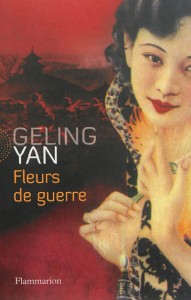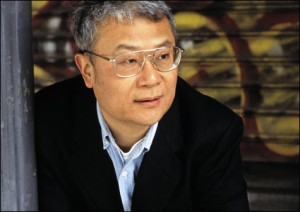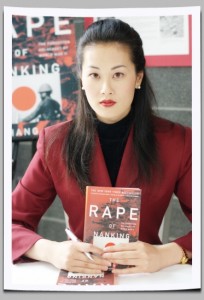 The Nanjing massacre and the 300,000 victims are one of the most tragic episodes in the history of the 20th century. It is rarely mentioned in Europe while the atrocities committed by the Japanese army during the storming of the former Chinese capital in December 1937 continue to poison relations between China and Japan.
The Nanjing massacre and the 300,000 victims are one of the most tragic episodes in the history of the 20th century. It is rarely mentioned in Europe while the atrocities committed by the Japanese army during the storming of the former Chinese capital in December 1937 continue to poison relations between China and Japan.
Many films but few novels, apart from the book by Ye Zhaoyan, were devoted to this drama . But two novels recently released by the Chinese writer, living in the United States, Ha Jin (“Nanjing Requiem “) and by the Chinese Geling Yan ( “Flowers of War “) , raise questions: can good literature arise from horror ?
Geling Yan : “Flowers of War ” novel or screenplay:?
“Flowers of War ” ( 1) has been revised several times by the writer; the title has even been modified to line up with the film that Zhang Yimou shot. Two prominent translators, Nicky Harman and Chantal Chen- Andro have translated the novel into English and French .
The story is told by Shujuan, one of the fifteen schoolgirls who could not escape the entry of the Japanese in Nanjing, and had to take refuge at the Mission St. Mary Magdalene. A group of prostitutes manages to enter and to camp in the cellar despite the protests of Father Engelmann and deacon Fabio Adornato .
It is a classic pattern of many English novels, ” upstairs – downstairs “. Both groups are at different floors and living together was difficult. But the prostitutes will demonstrate against the Japanese that they have more nobility of soul than the young residents.
The book reads easily and with pleasure but it is not really gripping. Too many issues, too many characters in a rather short book which looks for effects often modeled on a mode of movie storytelling . Several deadlocks: the Japanese are everywere but do not exist, they are puppets. Two interesting characters are not really highlighted: Yumo, one of the “stars” of the profession and the deacon Fabio . This child of missionaries born in China has a difficult relationship with Father Engelmann and is not really accepted by any of the two worlds .
That Geling Yan is translated into French is good news, although her best books are available only in English, but one can regret that the French publisher Flammarion introduced a ridiculous cover: ” they are made for love, will they be stronger than war ! “
” Flowers of War ” is the most expensive film in the history of Chinese cinema, a film prepared with the ambition to be a winner at the Academy Awards in the United States. In short, a great Hollywood type super production that should disturb neither in China or in the United States, but where it was needed to create a role for the actor Christian Bale (a character that does not exist in the novel) . The commercial success in China was as considerable as the flop registered in the United States and in the UK. !
Two other recent films illustrate the Nanjing massacres: a Chinese Film by Lu Chuan “City of Life and Death”, a film released in 2009, a black and white film , who wants to be a bit of a bridge between the two countries and won an award at the San Sebastian Festival.
Similarly, the film concerning ” John Rabe”, is quite interesting: the German leader of the Nazi party in Nanjing, organized the International Safety zone that saved the lives of 200 000 civilians .
Ha Jin, a Requiem for Nanjing:
 Ha Jin is in my opinion a major writer, author of two novels which are among the best I’ve read in recent years ( ” Waiting ” and ” War Trash”). He has analyzed the difficulties of the exercise but felt compelled to write a book on the Nanjing massacre, an event which in Japan is still camouflaged by many “revisionist” groups.
Ha Jin is in my opinion a major writer, author of two novels which are among the best I’ve read in recent years ( ” Waiting ” and ” War Trash”). He has analyzed the difficulties of the exercise but felt compelled to write a book on the Nanjing massacre, an event which in Japan is still camouflaged by many “revisionist” groups.
Ha Jin draws on the story and memoirs by Minnie Vautrin . Born in the countryside in Illinois, she went to university and became a missionary in China in 1912. She will head as from 1919 Ginling, the women college of Nanjing. During the onslaught by the Japanese, she will transform Ginling into a safe haven for women. But she could only limit the rapes and had to deliver to the Japanese soldiers a group of prostitutes. She will never forgive herself and depression led her to leave China in 1939 and eventually to commit suicide. She is a respected figure and her statue is part of the Memorial in Nanjing.
Ha Jin completed his book in 2011 after numerous versions, a 300-pages novel (2) which closely follows the Japanese massacres, the actions by Minnie Vautrin in Ginling and by John Rabe in the International Security Zone.
The reconstruction, the accurate descriptions are impressive but the result is somewhat disappointing. Ha Jin, given the subject, insists in adopting a non- emotional style, rather dull, especially as the narrator Anling is the Chinese assistant of Minnie Vautrin. Minnie is certainly not idealized but her character lacks depth , like that of Anling. The description of horrors is limited, the author is interested in the psychological impact on the victims; he does not want to work as a journalist or historian but he is trying to fight against the massacre denial.
It is not a coincidence that his book is one of his two novels allowed in China , the book had his visa but not the author !
Iris Chang and the Rape of Nanking :
 Both novels emphasize if compared the qualities of the “Rape of Nanking ” ( 3) by Iris Chang. The book published in the United States on the occasion of the sixtieth anniversary of the massacres, has had considerable success and figured on the bestseller list of the New York Times for six weeks, the title “The Forgotten Holocaust of World War II ” created a shock .
Both novels emphasize if compared the qualities of the “Rape of Nanking ” ( 3) by Iris Chang. The book published in the United States on the occasion of the sixtieth anniversary of the massacres, has had considerable success and figured on the bestseller list of the New York Times for six weeks, the title “The Forgotten Holocaust of World War II ” created a shock .
It is a book by an historian and journalist where we can feel life and emotions. This led to criticism from some American historians who would have preferred that these shameful events by the prime U.S. ally in Asia be forgotten. Moreover after the bombs of Hiroshima and Nagasaki, Japan claims to be a victim and not the aggressor in the Second World War .
But these massacres were not only camouflaged in Japan; in China after coming to power, the Communists wanted Japanese aid for their reconstruction, on top Nanjing was the seat of the Nationalist government and the Communists forces at the time did nothing to defend the city .
After the death of Mao and the deterioration of relations with Japan, the Chinese government insisted on the horrors of Nanjing as they have never been officially recognized by Japan. In addition, the Chinese public will readily ignite on the subject and often rightly so. Denial of many Japanese circles and the visits by many parliamentarians and politicians to the Yasukuni Shrine where is honored the memory of the dead but also that of war criminals are unacceptable.
As for Iris Chang, living constantly with horrors specially to write her latest book on the death march of prisoners of Bataan in the Philippines, led to a deep depression in 2004 which ended with her suicide at the age of 36 .
Bertrand Mialaret
(1) Geling Yan, “The Flowers of War” , translated by Nicky Harman. Vintage Books, 2013, 250 pages
(2) Ha Jin, ” Nanjing Requiem .” Pantheon Books, 2011.
(3) Iris Chang, ” The Rape of Nanking “, Penguin Books 1997, 290 pages .





